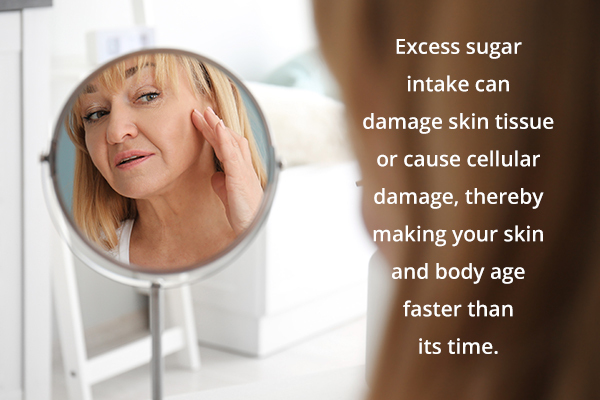In this article:
Sugar is naturally present in fruits, vegetables, milk, and carbohydrates or added to processed foods and beverages.

It is recommended to get your sugar from natural sources since they offer a variety of other nutrients as well to balance things off. Meanwhile, consuming processed or added sugar only increases your calorie intake while adding no nutritional value to your diet.
However, this doesn’t mean that you should gorge on natural sugar without a care in the world.
Excessive sugar intake in any form can lead to weight gain and a host of other health issues such as tooth decay, diabetes, and cardiovascular disease. (1) You have to be extra mindful of added sugars that have zero health benefits and substantial calorie count.
Reasons to Limit Your Sugar Intake
It may be impossible to give up sugar altogether, but you should still try your best to limit its intake. Here’s why:
1. Sugar increases the risk of obesity, diabetes, and heart disease
Research has shown that people who consume a lot of sugar are more likely to develop diabetes than those who don’t. (2) Plus, high sugar intake translates to excess calories, which make you put on weight and increase the risk of obesity.
Excessive sugar in the blood also damages your blood vessels and makes you more prone to heart disease. Recent studies have also pointed toward a possible link between sugar-rich diets and various types of cancer. (3)
2. Sugar can decrease immunity, impair digestion, and trigger inflammation
The gut contains different types of bacteria that exist in perfect equilibrium within a healthy body. The gut microbiota plays a crucial role in various body functions. Any disturbance in this microbiome can hamper your digestion, weaken your immune system, and trigger inflammation in the body. (4)
Excessive sugar intake is known to change the composition of your gut flora within a day. This disturbs the equilibrium between the gut microbes, and such imbalances negatively affect your overall health.
3. Sugar can impair your brain health

Eating too much fructose on a regular basis can damage your brain in such a way that your ability to learn and memorize becomes compromised. Adding more omega-3 fatty acids to your diet can help repair and reduce this cognitive damage. (5)
4. Sugar increases cholesterol levels
High glycemic diets can increase the amount of bad cholesterol (LDL) in the body and thereby negatively affect the ratio between bad and good cholesterol (HDL). (6)
Bad cholesterol sticks to the inner walls of arteries and builds up over time, restricting blood flow. As the blood passes through the constricted space, it exerts greater force on the arteries, resulting in high blood pressure.
High blood pressure and arterial damage pave the way for more serious heart ailments.
5. Sugar can disrupt your mood, energy, and appetite
Bingeing on sugar quickly shoots up your glucose levels, which uplifts your mood and makes you feel high on energy. But this sugar high is short-lived and is followed by a sugar crash, which makes you feel low. This sudden rise and fall in your glucose levels contribute to mood swings and fatigue and may even trigger headaches. (7)
Sugar high is also addictive, so your body wants to replicate it as soon as your blood sugar falls. This unstable blood sugar level, thus, makes you crave more sugar or carbs even when you aren’t hungry.
On the contrary, those who eat less sugar tend to get fewer cravings while experiencing more emotional stability and sustainable energy levels.
6. A high-sugar diet can lead to chromium deficiency
Chromium is a mineral that is essential for the body, but it is only needed in small amounts, making it a trace mineral. It basically assists the body in using insulin efficiently to maintain healthy and stable blood sugar levels.
People with diabetes or who consume a lot of sugar and carbs tend to run short of chromium. Reducing your carb intake is the best way to build up your chromium levels.
7. Sugar accelerates aging

Your skin, muscles, and body tissue are mostly composed of structural proteins. Digested sugar enters your blood and adheres to these proteins.
There is a non-enzymatic chemical reaction between the sugar and the proteins known as glycation. Glycation causes cellular or tissue damage, which makes your skin and body age faster than its time.
The breakdown of collagen and elastin makes your skin loose and wrinkly. Damage to the body tissue paves the way for various age-related illnesses. (8) Excess blood sugar leads to more glycation.
8. Sugar is bad for your oral health
Sugar is often the prime culprit behind dental problems and gum disease. The sugar or carbs that you consume will leave behind traces on the teeth and gums.
Your mouth naturally contains bacteria that feed on this sugar debris and proliferate. In the process of breaking down the sugar, the bacteria release acidic compounds that erode the protective outer layer of the teeth called the enamel, causing tooth decay and sometimes even cavities.
Plus, sugar fuels the overgrowth of bacteria in the mouth, which can trigger gum infections.
Proper oral hygiene is your best defense against such problems, besides limiting your sugar intake to less than 10% of your recommended daily caloric intake. You must brush twice a day – in the morning and before bedtime – to remove any trace of sugar from your teeth and gums. (9)
If left unchecked, chronic dental or gingival infections can contribute to the onset of more serious conditions down the line, including heart problems. (10)
9. Sugar takes the place of important nutrients
USDA data reveal that consuming more sugar corresponds to lesser nutrient intake. It was observed that people who had the highest sugar intake were consuming the least amount of essential nutrients, particularly vitamins A, C, and B12 and calcium, which are all crucial for the proper functioning of the body. (11)
Such eating patterns and the resulting nutritional deficiencies are especially dangerous to kids and adolescents who are still growing and need all the nutrients they can get to sustain this growth. Sadly, these age groups are also most likely to hog on sugar-filled foods and beverages.
Why Else Should Sugar Consumption Be Cut Down?
Foods high in added sugars often displace healthier, whole foods from the diet, leading you to miss out on an array of micronutrients needed for optimum nutrition.
What Are the Various Types of Sugar?

Sugar is found in all types of foods, under all sorts of names. Familiarize yourself with the names of hidden sugars and make sure to check the ingredients lists for these:
- Sugar has syrup in its name (examples: corn syrup, rice syrup, brown rice syrup)
- It word ends with –ose (examples: fructose, sucrose, maltose, and dextrose)
- It is right there in the name (examples: raw sugar, cane sugar, brown sugar, confectioner’s sugar)
Other examples: nectars, juice concentrates, honey, agave, molasses
What Are the Benefits of Reducing Sugar Intake?
Limiting sugar intake offers a multitude of benefits, including:
- Reducing cholesterol levels (12)
- Boosting heart health by lowering triglyceride levels (12)
- Better dental health
- Achieving and maintaining a healthy weight
- Better overall nutrition
- More energy
- Clearer skin and eyes
- Mood stabilization
- Reducing inflammation
- Less “brain fog”
What Are Ways to Cut Down on Sugar?

Here are some simple tips for reducing your sugar intake:
- Put the table sugar away (including syrups, honey, agave, and molasses). It’s easier to cut back on sugar that is added to things you eat or drink daily such as cereal, coffee, tea, and breakfast foods if the sugar is out of sight. You can start by cutting it in half, and slowly wean down from there.
- Swap out soda (including diet) for water or unsweetened herbal teas as your beverage choice throughout the day. This can be tough, particularly if you are also used to the caffeine, but it has a huge impact. Not only does it cut out sugar, but it also helps you stay hydrated and avoid “sugar crashes.”
- Go for fresh fruits when available. Frozen is also a great option. Dry fruits are also replete with sugar, so mind your portion sizes carefully. Avoid fruit canned in sugar or syrup as much as you can.
- When buying canned fruit, go for the ones that are soaked in water or natural juice rather than syrup. Make sure to drain the fluid after opening the can, and rinse the fruit in a colander to remove any trace of juice or added sugar on it.
- Read nutrition fact labels. Avoid or minimize foods with added sugars on the label.
- Sweeten naturally with fruit. For example, instead of high sugar yogurts, choose plain and doctor it up with some fresh fruit and oats.
- When using sugar for baking, decrease its quantity by one-third to one-half of what you were originally intending to add. This will hardly affect the taste of the final dish.
- Add flavor to your dishes by adding spices instead of sugar.
- Cut down your intake of sugar substitutes. Artificial sweeteners can be up to 1000% sweeter than actual sugar, which can trigger even more sugary cravings! (13)

Final Word
Like any major lifestyle change, the goal is progress, not perfection. Any small changes will be cumulative and can have a great impact on your health and your overall wellness goals.
Set yourself up for success by listing down your goals and what you hope to achieve by limiting sugar. Then, take small, attainable steps in reaching your goals. Try not to completely eliminate everything at one time. Build up on small successes for lasting change.
- Was this article helpful?
- YES, THANKS!NOT REALLY


